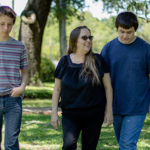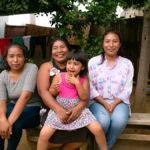KWAZULU-NATAL, South Africa—How many healing memories can $1.8 million buy for AIDS orphans?
It’s a question Children’s Emergency Relief International hopes to answer over the next three years through its Sinomlando/Memory Box Project partnership, based in the province of KwaZulu-Natal, South Africa.
|
South African children with one or both HIV positive parents prepare the memory boxes that will help them deal with becoming orphans. BCFS/CERI Photo
|
The Sinomlando project, named for the Zulu word meaning “we have a history,” is an ambitious effort that aims to lift the veil of silence that hangs over most families of people with AIDS. It is funded by a United States Agency for International Development grant as part of the President’s Emergency Plan For AIDS Relief.
According to the South Africa National Department of Health, the province of KwaZulu-Natal has the highest prevalence of people living with HIV—16.5 percent—in a country that has one of the highest rates in the world at just under 11 percent.
“Even more tragic are the numbers for women coming into antenatal care clinics” in the province, said Kevin Dinnin, president of Baptist Child & Family Services, CERI’s parent organization.
“Among women 15 to 24, the infection rate is 39.1 percent. Since this group has the highest fertility rate, the natural and tragic result is increasing numbers of orphans.”
A recent UNICEF report, based on 2005 statistics, estimates 1.2 million South African children have lost at least one parent to AIDS, and hundreds of thousands have lost both.

The Sinomlando project aims to keep hope alive in the eyes of AID orphans in South Africa. BCFS/CERI Photo
|
South African children, as a sign of respect, do not often or assertively ask questions of adults. That reluctance drapes another level of cultural silence over people with AIDS, CERI officials note.
Sign up for our weekly edition and get all our headlines in your inbox on Thursdays
“Often, the children are the primary caregivers to their parents during the illness. So, when their parents die, they think they have not cared for them well enough,” said CERI Executive Director Dearing Garner. “They often become depressed, drop out of school and display similar signs of emotional struggle.”
One significant South African response to the pandemic has been developed and refined by Philippe Denis, a professor at the University of KwaZulu-Natal in Pietermaritzburg and director of the Sinomlando Centre for Oral History and Memory Work in Africa. It entails the use of “memory boxes”—an oral history response in which children have the opportunity to hear their family’s stories within the confines of a safe place. Never Too Small To Remember, a book edited by Denis, describes the process and methodology of memory work.
“The purpose of the memory box is to develop resilience in orphans and vulnerable children, more particularly, those who are affected or infected by HIV/AIDS,” Denis explained. “Memory work is a form of psycho-social support to (the orphaned and vulnerable children) … which creates space for the caregivers to explain the history of the family to the children—a history which is often silenced because of grief, stigma and other reasons. This allows the children to make sense of their own history, however painful it may be. As they start to deal with their grief, they learn to cope better with their situation. Their chances of doing well at school and living a successful life are significantly enhanced.”
“One key feature of the program is the closure encounter, which occurs after a minimum of seven visits to a family by a trained memory worker, during which time a seriously ill or dying parent relates to the children the family’s history as well as any arrangements for the children’s future care in a warm and reassuring manner,” Garner added.
“The children are encouraged to ask questions, and the extended family is involved as much as possible. The entire exchange is tape-recorded or written so the children have a record to which they can refer later. The tape or transcript goes into a memory box, created by the family, along with mementos, photographs, letters and other emotionally important items.”
Memory box work is not merely a psychosocial response for those grieving or dying, noted Scott Houser, volunteer national director for CERI in South Africa.
“Ideally, memory work should become a feature of any and all homes and families, in that it encourages family members to tell and preserve their life history, much as many Americans wish they knew their grandparents or great-grandparents life stories.”
CERI’s partnership with Sinomlando is consistent with CERI’s philosophy of supporting overseas programs initiated, developed and led by local partners instead of automatically assuming it’s imperative to import American “solutions,” Garner said.
“Sinomlando has wanted to scale up its memory program for some time now. To that end, it has modified what used to be a 10-month part-time capacity building training program down to three months full-time. One aim of the three-year project is to train 135 memory trainers, 45 each year, in three groups of 15.”
The first group of 15, all from the Eastern Cape of South Africa, began their three-month training in mid-July.
Each graduate immediately will begin training others, who will train others in turn. After three years of the CERI-Sinomlando collaboration, organizers hope memory boxes will be the treasured possessions of more than 3,500 orphans. Even more importantly, the training will continue to spread even after the project ends.
“Sinomlando’s full-time staff consists of four South Africans, two Zimbabweans and a Belgian who has spent the greatest part of his working life in South Africa. They work in close cooperation with Houser, an employee of the Cooperative Baptist Fellowship with whom he works in South Africa as a regional coordinator. Houser, who grew up in Kenya and Tanzania, has lived in South Africa since 1989.
“We plead guilty to having a bias toward helping hurting children. We are grateful God has opened yet another avenue for BCFS/CERI to do just that,” Dinnin concluded.
“Children who go through the memory box process are often affirmed by their parents. It is common for dying parents to bless their children by pointing out their individual strengths to them and encouraging them to finish school.”
Additional information about the Sinomlando Center is available at www.sinomlando.org.za Information also is available on the Internet at www.bcfs.net and www.cerikids.org .














We seek to connect God’s story and God’s people around the world. To learn more about God’s story, click here.
Send comments and feedback to Eric Black, our editor. For comments to be published, please specify “letter to the editor.” Maximum length for publication is 300 words.